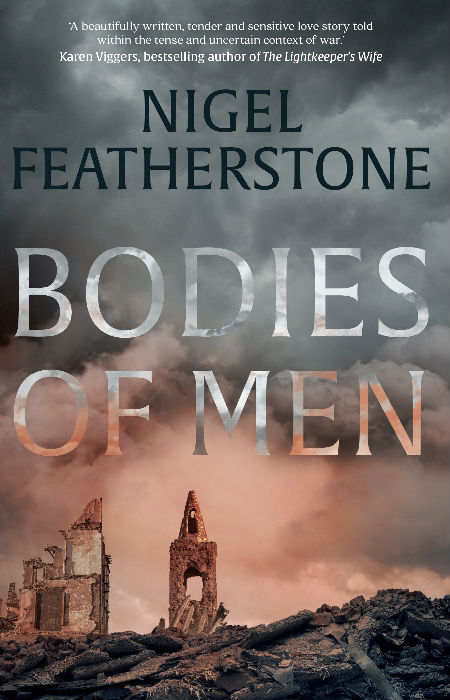
There are places in this world where it is hard to imagine beauty of any kind emerging.
Top of the list, with dubious honours, would have to be the theatre of war, that peculiarly destructive place where humanity supposedly fights one against the other but if we’re truly honest, against itself.
It’s bloody, awful and utterly pointless and Nigel Featherstone does not do much to dissuade us from this wholly valid point of view over the course of his emotionally-evocative book, Bodies of Men.
Set in Egypt in the midst of the Second World War, where the Australians and British are doing their best to stop the Italians, then members of the Axis members led by Germany (until, of course, they weren’t) this superbly-written novel dares to broach the idea that something beautiful can emerge in the midst of butchering and murderous mayhem.
Or rather, that something beautiful that began before the war can resurrect itself in the most unlikely of circumstances, one which in life, beauty and kindness, all of the things that sustain the human soul are running a poor and bloodied second to the very worse of our impulses.
“Every day that summer, William thought about James from Browning’s in the city, and every time he did so he felt an unearthly mix of excitement and trepidation. He had no idea where the feeling might take him, but what he did know was that he had to find a way of seeing James Kelly again.” (P. 39)
As is , truth be told, the idea that masculinity can be anything other than a brutish weapon of blunt-forced trauma.
That is especially apt in war, but frightfully so, also in peace, at least for twenty-one-year-old Australian corporal William Marsh who disembarks in Alexandria, Egypt in 1941, weighed down by the imminent threat of engagement with the enemy, but also by the harsh, unyielding expectations of his NSW state politician father, a man who regards his wife as a domestically-enabled possession and his son as an exemplar of his honour and manliness.
Marsh senior is a man driven by power and ambition, status and money, and as William finds himself in the midst of battle mere hours after his arrival, not quite living up to his idea of how a man should act as war rages around him, he begins to question what form masculinity really should take.
It’s not an openly-expressed idea since to do so would be tantamount to admitting that your whole life up to this point had been one precariously-balanced fabrication, twisting and turning on a heteronormative ideal that worships at the feet of career, marriage to a woman and the production of children who are little more than agents of your own broken ideas of masculinity.
(One of the great joys of the novel is the way it presents love and devotion between two men as an entirely beautiful, natural and life-affirming thing, every bit as much an authentically rich expression of human connectedness as any other.)
Closer to his beleaguered mother than his emotionally-distant father, Marsh is no stranger to thoughts that challenge the status quo, questions that begin to circle in his mind years later when he struck up a friendship, and the much more, with the son of a Milson’s Point shopkeeper and social activist, James Kelly.

Theirs is an instant connection, one that transcends the usual idea of male friendship, though neither of them is fully aware of its full scope nor the ramifications that will flow from it at the time.
Stymied at the time by events far beyond their control, William, the epitome of accepted expressions of masculinity, and James, who it is intimated is somewhat effeminate, an outlier from the Marsh family’s ideas of what it means to be a man, find their relationship rekindled, slowly and in pockets of stolen time, each of them seeking escape not simply from the mania of the war around them but from impossible ideals that neither have any hope of living up to.
Giving lie to the idea that beauty cannot exist in wartime, theirs is a slowly-unfurling love affair, one that finds its place messily and in awkward, uncertain steps, driven by desire certainly but by an unacknowledged need, by William at least, to be something other than the barren evocation of manhood celebrated by his father.
Bodies of Men is a masterful body of work, that explores what it means to belong, to a place and to someone else but to do so in ways that feel real and tangible and not the inhabiting of a construct to which you never signed up.
James is far more ready to jump into a future of ill-defined boundaries and likely social opprobrium simply because he has not been as yoked to toxic ideas of masculinity as William, but also because, in the 1941 here-and-new in which much of the book is set, save for flashbacks, and an epilogue which is as close to being a perfect ending as a book can get, his wartime experience has spurred him to challenge and reject much of his life (save for his devotion to his mum) up to this point.
“William won the series, six to five.
‘Let’s go out for a walk,’ said James.
‘We can’t,’ said William. ‘We have to be careful, you know that.’
‘No, we have to be carefree.'” (P. 199)
William is not quite so lucky, and his journey to a place where he can express his yearning and desire, both for James and something beyond the prison of forced masculinity his father has constructed for him, takes far longer, interrupted by war (oddly enough, even here, his father’s long hand reaches him though it is stymied by another’s) and his own inner voice which takes a long time to stop replaying the paternal “truisms” which have propelled him until then.
Bodies of Men is in many ways a tender, touching, compassionate love story, one which doggedly challenges, the most nuanced and thoughtfully-expressed of ways, what it means to be a man.
It is no accident, I suspect, that Featherstone has chosen to set his quietly-enunciated but emotionally-rousing story in wartime since in 1941 this is the most extreme example of traditional masculinity in all its misbegotten, twisted, broken, strident glory.
It could just as easily have worked in other settings but there is something about a place and time like this that forces both men to confront, challenge and then embrace their inner voices which tell them, social convention of all kinds be damned, that what they have, know and feel is far more real that the paper dragons of manliness that have sustained them until now (or rather not, since both men are diminished by ideals that demand much and give precious little to nothing in return.
A towering work that accomplishes so much 324 exquisitely well-judged pages, Bodies of Men is testament to the fact that beauty can emerge in the most extraordinary of places, that love finds expression in ways so multitudinous that we do it a disservice by corralling it within narrow confines, and that the greatest thing we can often do for ourselves is to ask “why not?” and keep pushing forward until we get an answer.